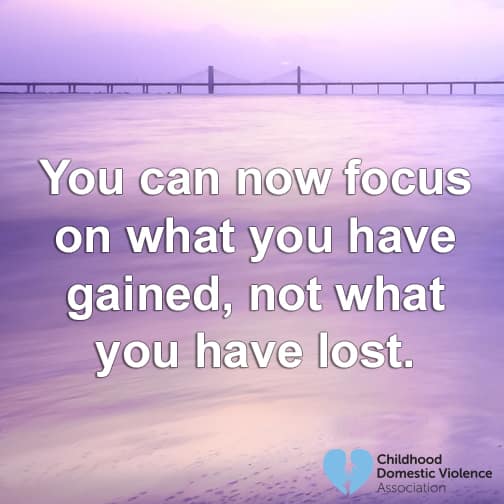Childhood Domestic Violence Teaches Us a Lie: Sadness is Inevitable and Deserved
Many people who grew up with domestic violence in their childhood home become lost to depression or to a pervading SADNESS that prevents them from reaching their full potential in adulthood. That sadness is a very real and natural reaction to the losses they suffered in childhood: the loss of safety, comfort, stability, innocence, and often, the total loss of being a child.
But those people are living a LIE: that their sadness is inevitable, permanent, and deserved.
Here, I’m going to look at the lies surrounding sadness, why you believe them, and what you can do to move beyond them. I’ll also suggest a few exercises that will help you to heal the sadness – or replace it with something that leads to happiness.
The Lie
You were meant to be SAD. Sadness is a constant that will always be with you. Things can be going great, but then a few minutes later, you sink into sadness and cannot get out. You go through life focused on what was taken from you, what you didn’t get. This is just how you are and who you always will be.
The Why
You feel as though you lost something because of the type of home you grew up in: love from your parents, your childhood, important relationships. You try to heal yourself, fill the emptiness caused by your pain, and end your sadness by focusing on yourself. But when you simply focus on yourself, you typically feel worse.
The Truth
You are GRATEFUL for what you have. You are no longer in the environment of your childhood. And you can now focus on what you have gained, not what you have lost. But how can you find this gratitude within yourself?
Gratitude comes to life through service without expectation of anything in return. Here I give you 3 tips to be grateful every day.
Tips to Try
1) When you feel the urge to do or say something hurtful toward another, break your brain’s pattern by saying aloud to yourself, “I am above this. This is not me. It’s just a pattern.” You were born to take pain away. Not to be the cause of it.
2) When you find yourself feeling sad and notice that you are too focused on yourself, take an action that serves another. Call someone and tell them you were thinking about them. Ask someone how their day is going and really take the time to listen. Try anything that makes another person feel appreciated.
3) I know it’s difficult to give when you feel you don’t have much to give; but that is why it is so powerful. You can become a role model for another because of what you have experienced; you can help your own child or another adult who does not know what you know. Create a schedule that allows you to consistently serve another: once a day, once a week, or even just an hour a month. The key is to schedule simple actions that create the habit.
Which tip above will you try first? Or go ahead and give one a try and share your experience in the comments below!
A detailed overview of the SAD lie can be found in CHAPTER 4 (“Sad to Grateful”) of INVINCIBLE: The 10 Lies You Learn Growing Up With Domestic Violence, and the Truths to Set You Free.



Well, the sadness is something that I have to think all DV victims can identify with. It’s the way I’ve always lived. It’s extremely tough to find hope and joy in daily life. Thanks for the article.
Sadness is certainly one of the strongest and most prevalant lies. And most people who grew up with domestic violence in their childhood home do consider it part of daily life. We hope this article helps you and others realize that chronic sadness or depression doesn’t have to be “normal”. Thanks for commenting. Be well.